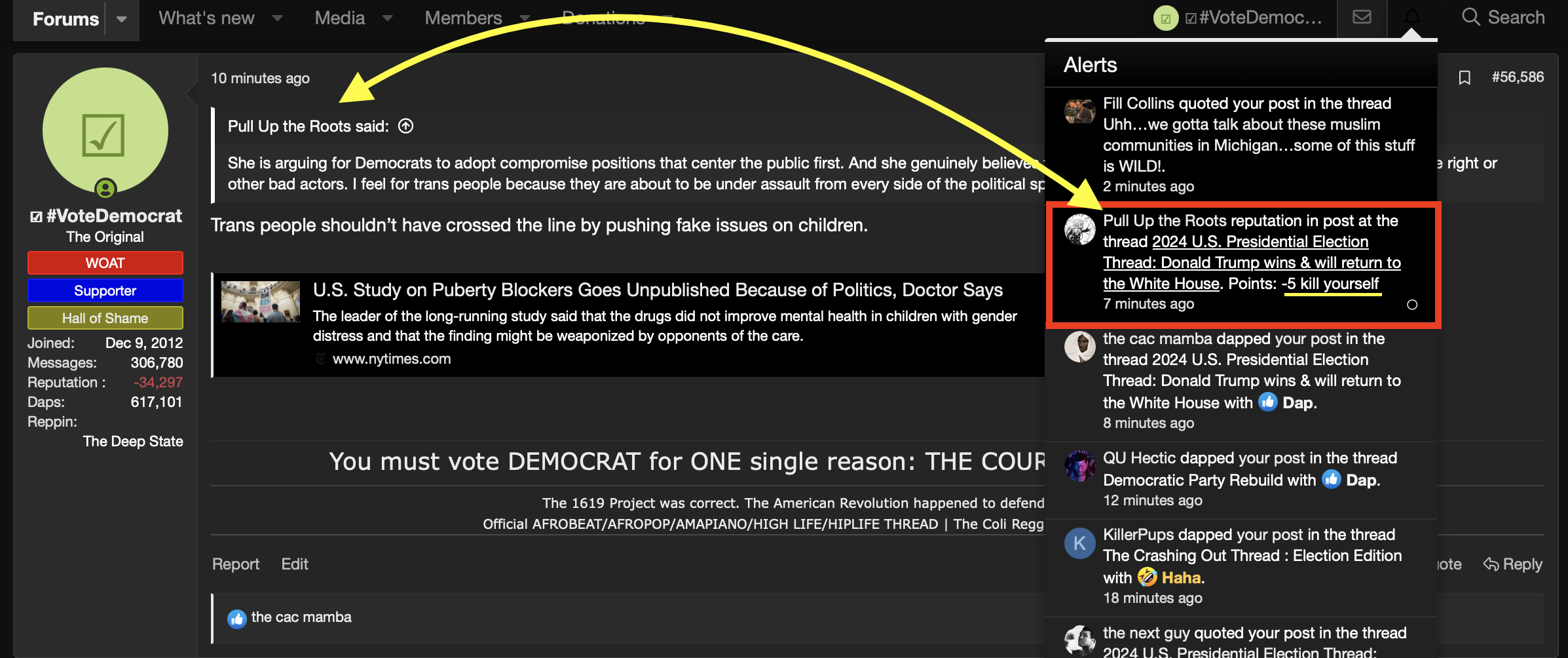The leader of the long-running study said that the drugs did not improve mental health in children with gender distress and that the finding might be weaponized by opponents of the care.

www.nytimes.com
U.S. Study on Puberty Blockers Goes Unpublished Because of Politics, Doctor Says
Summarize
The leader of the long-running study said that the drugs did not improve mental health in children with gender distress and that the finding might be weaponized by opponents of the care.
Published Oct. 23, 2024Updated Oct. 24, 2024
A view looking up into the cupola of the Texas state capitol rotunda as LGBTQ+ rights activists protest, carrying signs that say, most prominently in the foreground, "Let trans kids grow up."
An influential doctor and advocate of adolescent gender treatments said she had not published a long-awaited study of puberty-blocking drugs because of the charged American political environment.
The doctor, Johanna Olson-Kennedy, began the study in 2015 as part of a broader, multimillion-dollar federal project on transgender youth. She and colleagues recruited 95 children from across the country and gave them puberty blockers, which stave off the permanent physical changes — like breasts or a deepening voice — that could exacerbate their gender distress, known as dysphoria.
The researchers followed the children for two years to see if the treatments improved their mental health. An older Dutch study had found that puberty blockers improved well-being, results that inspired clinics around the world to regularly prescribe the medications as part of what is now called gender-affirming care.
But the American trial did not find a similar trend, Dr. Olson-Kennedy said in a wide-ranging interview. Puberty blockers did not lead to mental health improvements, she said, most likely because the children were already doing well when the study began.
“They’re in really good shape when they come in, and they’re in really good shape after two years,” said Dr. Olson-Kennedy, who runs the country’s largest youth gender clinic at the Children’s Hospital of Los Angeles.
That conclusion seemed to contradict an earlier description of the group, in which Dr. Olson-Kennedy and her colleagues noted that one quarter of the adolescents were depressed or suicidal before treatment.
In the nine years since the study was funded by the National Institutes of Health, and as medical care for this small group of adolescents became a searing issue in American politics, Dr. Olson-Kennedy’s team has not published the data.
Asked why, she said the findings might fuel the kind of political attacks that have led to bans of the youth gender treatments in more than 20 states, one of which will soon be considered by the Supreme Court.
“I do not want our work to be weaponized,” she said. “It has to be exactly on point, clear and concise. And that takes time.”
She said that she intends to publish the data, but that the team had also been delayed because the N.I.H. had cut some of the project’s funding. She attributed that cut, too, to politics, which the N.I.H. denied. (The broader project has received $9.7 million in government support to date.)
Dr. Olson-Kennedy is one of the country’s most vocal advocates of adolescent gender treatments and has served as an expert witness in many legal challenges to the state bans. She said she was concerned the study’s results could be used in court to argue that “we shouldn’t use blockers because it doesn’t impact them,” referring to transgender adolescents.
Other researchers, however, were alarmed by the idea of delaying results that would have immediate implications for families around the world.
“I understand the fear about it being weaponized, but it’s really important to get the science out there,” said Amy Tishelman, a clinical and research psychologist at Boston College who was one of the study’s original researchers.
Dr. Tishelman also noted that, even if the drugs did not lead to psychological improvements, they may have prevented some of the children from getting worse. “No change isn’t necessarily a negative finding — there could be a preventative aspect to it,” she said. “We just don’t know without more investigation.”
In the 1990s and 2000s, doctors in the Netherlands began studying a small group of children who had experienced intense gender dysphoria since early childhood. For most of these children, the negative feelings dissipated by puberty. For others, puberty made them feel worse.
For those who struggled, the researchers began prescribing puberty blockers, which had long been used to treat children whose puberty began unusually early. The Dutch scientists reasoned that by preventing the permanent changes of puberty, transgender adolescents would fare better psychologically and fit in more comfortably in society as adults.
In 2011, the researchers reported on the first 70 children who were treated with the so-called Dutch Protocol. The children were thoroughly assessed to make sure that they had persistent dysphoria and supportive parents and that they did not have serious psychiatric conditions that might interfere with treatment.
These patients showed some psychological improvements after puberty blockers: fewer depressive symptoms, as well as significant declines in behavioral and emotional problems. All the patients chose to continue their gender transitions by taking testosterone or estrogen.
The findings were highly influential even before they were published, and clinics around the world opened to treat transgender adolescents with puberty blockers and hormones.
England’s youth gender clinic in 2011 tried to replicate the Dutch results with a study of 44 children. But at a conference five years later, the British researchers reported that puberty blockers had not changed volunteers’ well-being, including rates of self-harm. Those results were not made public until 2020, years after puberty blockers had become the standard treatment for children with gender dysphoria in England.
In 2020, Dr. Olson-Kennedy’s group described the initial psychological profile of the children enrolled in the U.S. study of puberty blockers, whose average age was 11. Before receiving the drugs, around one quarter of the group reported depression symptoms and significant anxiety, and one quarter reported ever having thoughts of suicide. Eight percent reported a past suicide attempt.
In a progress report submitted to the N.I.H. at that time, Dr. Olson-Kennedy outlined her hypothesis of how the children would fare after two years on puberty blockers: that they would show “decreased symptoms of depression, anxiety, trauma symptoms, self-injury, and suicidality, and increased body esteem and quality of life over time.”
That hypothesis does not seem to have borne out. “They have good mental health on average,” Dr. Olson-Kennedy said in the interview with The New York Times. “They’re not in any concerning ranges, either at the beginning or after two years.” She reiterated this idea several times.
When asked in follow-up emails to clarify how the children could have good initial mental health when her preliminary findings had showed one quarter of them struggling, Dr. Olson-Kennedy said that, in the interview, she was referring to data averages and that she was still analyzing the full data set.
Dr. Hilary Cass, a pediatrician who this year published an extensive review of youth gender services in England, said that the delays from the American and British research groups had led the public to believe that puberty blockers improved mental health, even though scant evidence backed up that conclusion.
“It’s really important we get results out there so we understand whether it’s helpful or not, and for whom,” Dr. Cass said.
Her report found weak evidence for puberty blockers and noted some risks, including lags in bone growth and fertility loss in some patients. It prompted the National Health Service in England to stop prescribing the drugs outside of a new clinical trial, following similar pullbacks in several other European countries.
An N.I.H. spokesman said that while the agency generally encourages the publication of data supported by its grants, researchers decide how and when to do so.
Dr. Olson-Kennedy’s collaborators have also not yet published data they collected on how puberty blockers affected the adolescents’ bone development.
But many other papers have been published from the wider N.I.H. project, including a 2023 study of older transgender and nonbinary adolescents who took estrogen or testosterone to aid their gender transition. After two years on hormones, the volunteers showed improvements in life and body satisfaction, and patients taking testosterone showed declines in depression and anxiety. (Two of the 315 patients died by suicide, a rate much higher than the general population.)
Dr. Olson-Kennedy noted that doctors’ clinical experience was often undervalued in discussions of research. She has prescribed puberty blockers and hormonal treatments to transgender children and adolescents for 17 years, she said, and has observed how profoundly beneficial they can be.
Although the N.I.H. studies are large, she said, “these are minuscule compared to the amount of people that we’ve taken care of.”


 www.nytimes.com
www.nytimes.com














